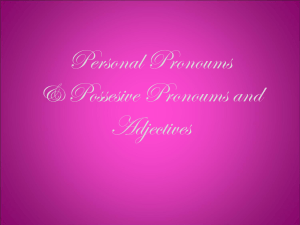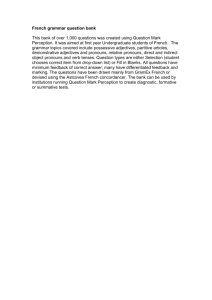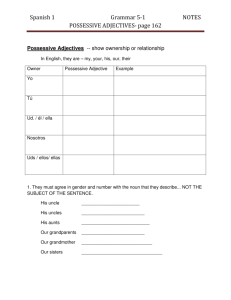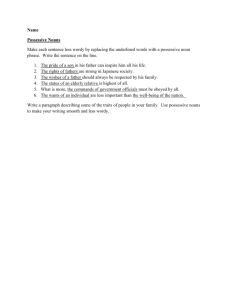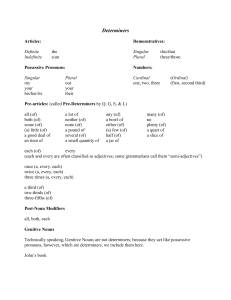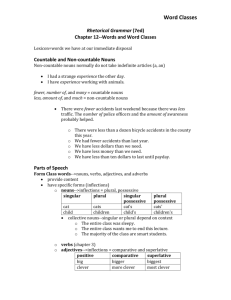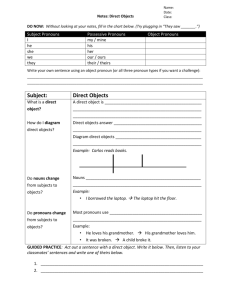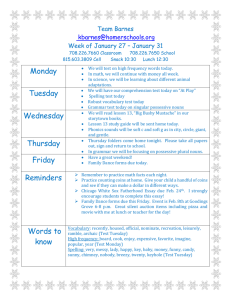Story PowerPoint
advertisement
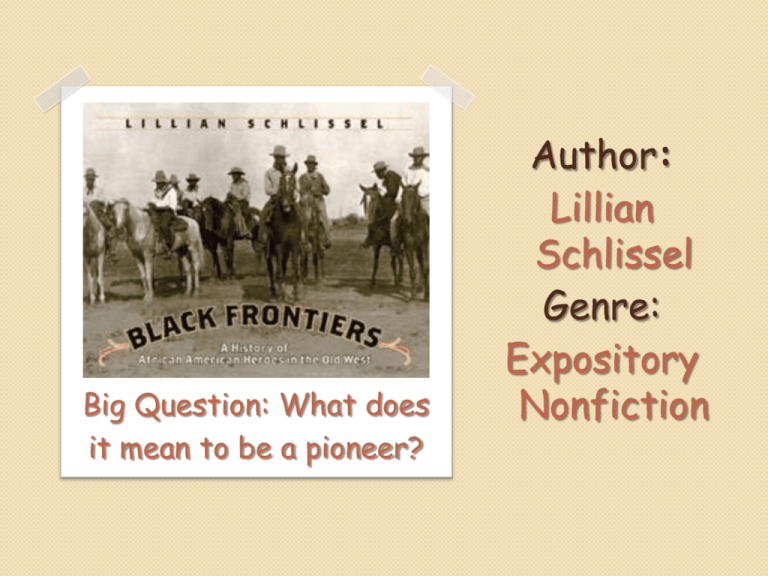
Big Question: What does it mean to be a pioneer? Author: Lillian Schlissel Genre: Expository Nonfiction Small Group Timer Review Games Story Sort Vocabulary Words: Arcade Games Study Stack Spelling City: Vocabulary Spelling City: Spelling Words Spelling Words Words with ci and ti • precious • commercial • especially • ancient • gracious • position • question • suggestion • friction • lotion • potion • digestion • artificial • glacier • cautious • efficient • sensational • vicious • official • ration • fictitious • vaccination • beneficial • precocious • emancipation Big Question: What does it mean to be a pioneer? Monday Tuesday Wednesday Thursday Friday Vocabulary Words Vocabulary Words bondage commissioned earthen encounter homesteaders settlement More Words to Know desolate sharecroppers herd legend rugged scout Monday Question of the Day What does it mean to be a pioneer? Today we will learn about: Build Concepts Cause and effect Prior Knowledge Build Background Vocabulary Fluency: Tone of Voice Grammar: Possessive Pronouns Spelling: Words with ci and ti American Frontier Fluency Model Tone of Voice Fluency: Model Tone of Voice Listen as I read “Under the Coonskin Cap.” As I read, notice how I use my tone of voice to show the humor. Imagine sitting around a campfire listening to a storyteller. Be ready to answer questions after I finish. Fluency: Model Tone of Voice What caused Davy Crockett to join the Tennessee Volunteer Militia? What kind of character does the text present in its description of Crockett? Concept Vocabulary herd – to care for and drive cattle legend – a person whose achievements and deeds are a part of history rugged – rough, sturdy, hardy, and strong scout – person sent to find out what the enemy is doing (Next slide) herd rugged scout Concept Vocabulary (To add information to the graphic organizer, click on end show, type in your new information, and save your changes.) Build Concept Vocabulary herd, legend, rugged, scout Work American Frontier Pioneers Military Cause and Effect, Prior Knowledge Turn to Page 456 - 457. Prior Knowledge Name important events you know about the Civil War and the nation’s growth in the years that followed. Date Prior Knowledge This week’s audio explores African American cowboys. After we listen, we will discuss what you learned about African Americans and the Wild West. Vocabulary Words Vocabulary Words bondage – being held against your will under the control of another; slavery commissioned – holding the rank of second lieutenant or above in the U.S. Army earthen – made of ground, soil, or earth Vocabulary Words encounter – meet unexpectedly; meet in a battle homesteaders – persons who own and live on land granted by the U.S. government settlement – group of buildings and the people living in them More Words to Know desolate – not lived in; deserted sharecroppers – people who farm land for the owner in return for part of the crops (Next Slide) bondage earthen settlement desolate homesteaders sharecroppers Grammar Possessive Pronouns having they own land was pretious to formerly enslaved african americans Having their own land was precious to formerly enslaved African Americans. in the southwest, many people builded them homes from dried mud. In the Southwest, many people built their homes from dried mud. Possessive Pronouns We had a new appreciation for our basic freedoms after we read the amendments to the Constitution. Our is a possessive pronoun that shows ownership. Ask the question “to whom does our freedom belong,” and the answer is “our freedom belongs to us.” Possessive Pronouns Pronouns that show ownership are called possessive pronouns. A possessive pronoun and its antecedent must agree in number and gender. Possessive Pronouns Before you use a possessive pronoun, ask yourself whether the antecedent is singular or plural. If the antecedent is singular, decide whether it is masculine, feminine, or neuter. Then choose a pronoun that agrees. Possessive Pronouns My/mine, your/yours, his, her/hers, its, our/ours, their/theirs My, your, her, our, and theirs are always used with nouns. Your understanding of history is important. Possessive Pronouns Mine, yours, hers, ours, and theirs stand alone. Is that history book yours? Possessive Pronouns His and its can be used with nouns or can stand alone. His book report was on a biography of Satchel Paige. The book about Satchel Paige was his. Do not use an apostrophe with a possessive pronoun. Possessive Pronouns Find the possessive pronouns. Research increased my understanding of the Civil War. my Some homesteaders built their houses by piling layers of sod. their Possessive Pronouns Find the possessive pronouns. The Nicodemus Blues was one of our nation’s first black baseball teams. our Is American history your favorite subject? your Possessive Pronouns Find the possessive pronouns. That Louisiana farmer was able to buy his own land. his The soldiers in the Union Army knew the uniforms were theirs. theirs Possessive Pronouns Find the possessive pronouns. The goat used its hooves to climb through the snow. its The report about African American cowboys is mine. mine Possessive Pronouns Find the possessive pronouns. This antique sewing machine is ours, and that spinning wheel is hers. ours, hers My dream of freedom is the same as yours. My, yours Possessive Pronouns Choose the correct possessive pronouns. On July 31, the town of Dunlap celebrated (its, his) own holiday. its The pioneer woman warmed (her, hers) home with fire fueled from buffalo chips. her Possessive Pronouns Find the possessive pronouns. In hot, dry climates, pioneers used adobe bricks to build (their, theirs) homes. their The Civil War tore apart this country of (our, ours). ours Possessive Pronouns Find the possessive pronouns. (Your, yours) family has a long history in this community. Your Spelling Words Words with ci and ti • precious • commercial • especially • ancient • gracious • position • question • suggestion • friction • lotion • potion • digestion • artificial • glacier • cautious • efficient • sensational • vicious • official • ration • fictitious • vaccination • beneficial • precocious • emancipation Tuesday Question of the Day What were some things that made pioneer life difficult? Today we will learn about: Vocabulary Strategy Lesson: Context Clues Cause and Effect Prior Knowledge Author’s Purpose Vocabulary Fluency: Choral Reading Grammar: Possessive Pronouns Spelling: Words with ci and ti Time for Social Studies: The Reconstruction Period The Westward Movement American Frontier Vocabulary Strategy: Context Clues Turn to Page 458- 459. Black Frontiers Turn to Page 460 - 467. Fluency Choral Reading Fluency: Choral Reading Turn to page 462, beginning with “He said he had been a soldier,” through page 463. As I read, notice for my softer tone as I read what Solomon says about Kansas. We will practice as a class doing three choral readings. Grammar Possessive Pronouns befour the civil war fricion arose between the north and the south Before the Civil War, friction arose between the North and the South. in 1879 freedom will be cherished, especialy by former slaves In 1879 freedom was cherished, especially by former slaves. Possessive Pronouns Pronouns that show ownership are called possessive pronouns. My, your, her, our, and their are used before nouns. Mine, yours, hers, ours, and theirs are used alone. His and its can be used with nouns or can stand alone. Spelling Words Words with ci and ti • precious • commercial • especially • ancient • gracious • position • question • suggestion • friction • lotion • potion • digestion • artificial • glacier • cautious • efficient • sensational • vicious • official • ration • fictitious • vaccination • beneficial • precocious • emancipation Wednesday Question of the Day What are similarities in the ways black and white Americans helped in the expansion of the country? Today we will learn about: Cause and Effect Prior Knowledge Context Clues Vocabulary Fluency: Tone of Voice Grammar: Possessives Pronouns Spelling: Words with ci and ti Time for Social Studies: native American and African Americans American Frontier Black Frontiers Turn to Page 468 - 474. Fluency Tone of Voice Fluency: Tone of Voice Turn to page 473, first paragraph. As I read, notice how my voice takes on a serious tone as the writer draws a conclusion. Now we will practice together as a class by doing three choral readings. Grammar Possessive Pronouns nearly 180,000 african americans fighted in the union army Nearly 180,000 African Americans fought in the Union Army. every enslaved person longed for he or she freedom Every enslaved person longed for his or her freedom. Possessive Pronouns Pronouns that show ownership are called possessive pronouns. My, your, her, our, and their are used before nouns. Mine, yours, hers, ours, and theirs are used alone. His and its can be used with nouns or can stand alone. Possessive Pronouns Possessive pronouns can make your writing easier to read if they are used correctly. No: Are you coming to mine? Yes: Are you coming to my recital? Possessive Pronouns Check something you have written to see if you have used possessive pronouns correctly. Spelling Words Words with ci and ti • precious • commercial • especially • ancient • gracious • position • question • suggestion • friction • lotion • potion • digestion • artificial • glacier • cautious • efficient • sensational • vicious • official • ration • fictitious • vaccination • beneficial • precocious • emancipation Thursday Question of the Day Are dreams necessary for growth and change? Explain. Today we will learn about: Poetry Genre Reading Across Texts Fluency: Partner Reading Grammar: Possessive Pronouns Spelling: Words with ci and ti Make a Map “Poems by Langston Hughes” Turn to Page 476 - 477. Fluency Partner Reading Fluency: Partner Reading Turn to page 473, first paragraph. Read this page three times with a partner. Be sure to read using a serious, convincing tone. Offer each other feedback. Grammar Possessive Pronouns the indians nicknamed the black troops buffalo soldiers The Indians nicknamed the black troops Buffalo Soldiers. the farmers pateintly waited for his crops to grow. The farmers patiently waited for their crops to grow. Possessive Pronouns Pronouns that show ownership are called possessive pronouns. My, your, her, our, and their are used before nouns. Mine, yours, hers, ours, and theirs are used alone. His and its can be used with nouns or can stand alone. Possessive Pronouns Test Tip: When taking a test, remember that possessive pronouns do not use apostrophes. Do not confuse possessive pronouns with contractions that combine a pronoun with a verb. Possessive Pronouns No: Find you’re coat. Yes: Find your coat. No: The dog hurt it’s paw. Yes: The dog hurt its paw. Spelling Words Words with ci and ti • precious • commercial • especially • ancient • gracious • position • question • suggestion • friction • lotion • potion • digestion • artificial • glacier • cautious • efficient • sensational • vicious • official • ration • fictitious • vaccination • beneficial • precocious • emancipation Friday Question of the Day What does it mean to be a pioneer? Today we will learn about: Build Concept Vocabulary Cause and Effect Author’s Viewpoint/Bias Context Clues Grammar: Possessive Pronouns Spelling: Words with ci and ti Note Taking American Frontier Cause and Effect A cause is what makes something happen. An effect is something that happens as a result of a cause. Sometimes several causes lead to one effect. Cause and Effect Clue words and phrases, such as consequently, as a result, and therefore, can help you spot cause-effect relationships. Sometimes, though, there are no clue words. Author’s Viewpoint/Bias A viewpoint is how a person looks at the world. Every person has his or her own individual viewpoint of events, people, and ideas. Author’s Viewpoint/Bias A bias is a slant. If a person is biased about a topic, he or she has a slanted view of that topic. Being biased is the opposite of being objective. Context Clues You can use context clues to determine the meaning of unfamiliar words. List any unfamiliar words you find while reading Black Frontiers. Create a chart showing the unfamiliar word, helpful context clues, and the definition of the word based on its context. Context Clues Word Context Clues Meaning How can you keep track of the information you find while doing research, reading a story, or studying? Taking notes is a good way to record your findings, as well as sort and remember information. Note Taking In doing research, keep key words and questions in front of you so that you can refer to them and remember to make notes about them. Paraphrase, or state the information in your own words. Note Taking Use keywords, phrases, or short sentences. Synthesize, or combine, the information to include only important details. Grammar Possessive Pronouns the riverboat Captain was cautous about giving passage to the sharecropper The riverboat captain was cautious about giving passage to the sharecropper. in the Winter, pioneers stayed w arm under earthen rooves In the winter, pioneers stayed warm under earthen roofs. Possessive Pronouns Pronouns that show ownership are called possessive pronouns. My, your, her, our, and their are used before nouns. Mine, yours, hers, ours, and theirs are used alone. His and its can be used with nouns or can stand alone. Spelling Words Words with ci and ti • precious • commercial • especially • ancient • gracious • position • question • suggestion • friction • lotion • potion • digestion • artificial • glacier • cautious • efficient • sensational • vicious • official • ration • fictitious • vaccination • beneficial • precocious • emancipation We are now ready to take our story tests. Story test ◦ Classroom webpage, ◦ Reading Test AR ◦ Other Reading Quizzes ◦ Quiz #

